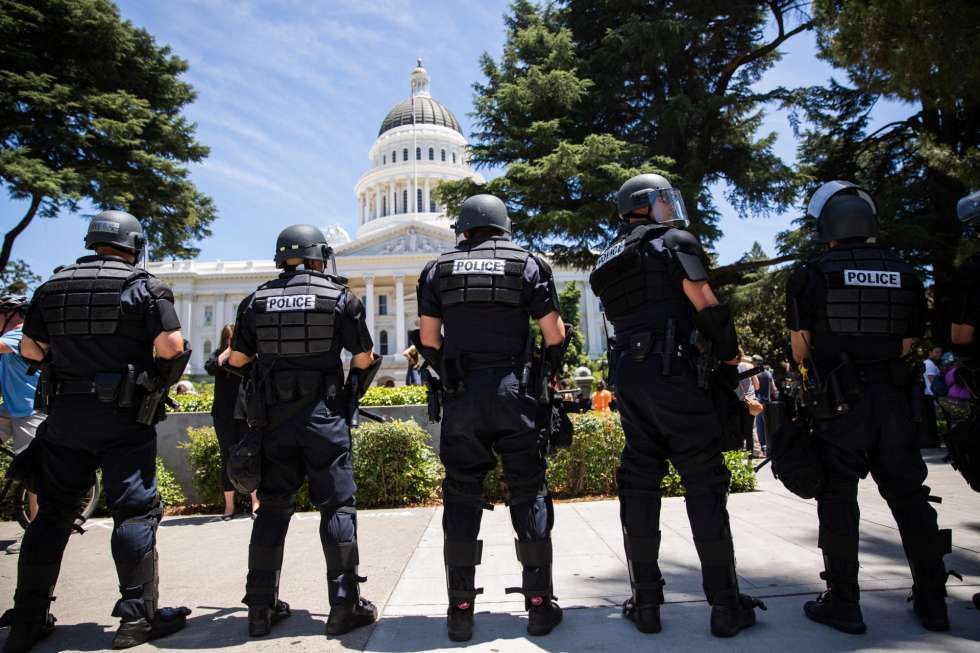Assembly passes stricter use-of-force bill, suggesting police unions have lost clout at state Capitol

For the second year in a row, a sweeping police reform measure that law-enforcement organizations said was motivated by antipathy toward peace officers has been embraced by the state Legislature.
Last year lawmakers passed Senate Bill 1421 by Sen. Nancy Skinner, D-Berkeley. It required police agencies to release information on officer discipline records – treating these records the same as many others that are routinely released to the public under government openness laws. California’s police disclosure rules previously had been among the strictest in the nation.
This year, Assembly Bill 392, by Assemblywoman Shirley Weber, D-San Diego, appears headed for passage after being approved 67-0 by the Assembly on Wednesday. It says officers may only use lethal force if it is “necessary” for public safety. Existing law says officers can use such force if they believe it is “reasonable” to ensure public safety. While provisions in Assembly Bill 392 were dropped to persuade law enforcement organizations to end their opposition and take a neutral stand – as they did last week – the ACLU says the bill will create among the strictest use-of-force standards of any state.
These organizations were lobbied by Gov. Gavin Newsom to accept Assembly Bill 392. After their decision to go neutral was announced, Newsom, Assembly Speaker Anthony Rendon and Senate President Pro Tem Toni Atkins issued a joint statement endorsing Weber’s bill, seemingly guaranteeing its eventual approval.
The passage of the two reform measures would have been impossible to imagine earlier this century. Law enforcement unions had tight relationships with most elected Democrats, the same as with unions for teachers, nurses, service workers and government bureaucrats, providing them with heavy campaign contributions.
Gov. Gray Davis’ 2001 decision to give prison guards a five-year, 37 percent raise after its union helped him get elected in 1998 drew sharp blow-back from good-government advocates and newspaper editorial boards, especially after the 2003 revelation that Davis had badly underestimated the long-term cost of the labor deal. It was among the issues that helped lead to his unprecedented recall later that year.
2004 CHP scandal downplayed by state leaders
But the clout of law enforcement was again on display a year later. In 2004, the Sacramento Bee broke the story of a pervasive workers’ compensation scam in the upper reaches of the California Highway Patrol. The Bee found that 55 of the 65 senior CHP officers who had retired since 2000 had filed workers’ comp claims – with some citing injuries never reported while they were on the job. Their disability claims were routinely approved, sharply increasing their retirement benefits.
CHP Commissioner Dwight “Spike” Helmick agreed to retire after the “Chiefs Disease” scandal broke, then added to it by also claiming he was disabled because of vehicle accidents in the 1970s and 1980s. But neither the Legislature or Republican Gov. Arnold Schwarzenegger – who courted and won law enforcement support – agreed with calls to bring in an outside reformer to run the agency. Instead, Schwarzenegger chose Mike Brown, one of Helmick’s top aides.
Attorney General Bill Lockyer declined to prosecute the case, citing conflicts of interest because of his office’s close ties to the CHP. The case was assigned to Sacramento County District Attorney Jan Scully. But in 2007, she closed the investigation without bringing any charges. Scully said CHP officials and former officials were “unable or unwilling” to testify about the pension-spiking scheme. The story faded from the headlines.
But ties between lawmakers and police unions have weakened since then as the national outcry has grown over alleged police mistreatment of minorities, especially a series of fatal shootings of young African-American men in questionable circumstances. The California Democratic Party has also had an influx of newly elected progressive lawmakers who dislike the aggressive, confrontational policing style adopted by many departments after it was credited with reducing crime in New York City in the 1990s under Mayor Rudolph Giuliani.
Recent analyses of how Assembly Bill 392 overcame the obstacles that doomed a similar bill last year have focused on the March 2018 fatal shooting of Stephon Clark, an unarmed black father of two, in Sacramento.
The announcement two months ago that no officer would face charges for Clark’s death triggered an outcry so intense it became a national and international story that appeared to give Weber’s bill new momentum.
Chris Reed
Chris Reed is a regular contributor to Cal Watchdog. Reed is an editorial writer for U-T San Diego. Before joining the U-T in July 2005, he was the opinion-page columns editor and wrote the featured weekly Unspin column for The Orange County Register. Reed was on the national board of the Association of Opinion Page Editors from 2003-2005. From 2000 to 2005, Reed made more than 100 appearances as a featured news analyst on Los Angeles-area National Public Radio affiliate KPCC-FM. From 1990 to 1998, Reed was an editor, metro columnist and film critic at the Inland Valley Daily Bulletin in Ontario. Reed has a political science degree from the University of Hawaii (Hilo campus), where he edited the student newspaper, the Vulcan News, his senior year. He is on Twitter: @chrisreed99.
Related Articles
Luntz Warns Divided GOP on Taxes
MARCH 21, 2011 UPDATED 8:15 p.m. By KATY GRIMES As nearly 2,000 Republicans from around the state met in Sacramento
Gavin Newsom takes steps to run for governor of California
Shaking up an already fast-moving political landscape, Lt. Gov. Gavin Newsom revealed in an email to his list that he had taken
Study lobbies for more spending
JUNE 28, 2010 By LAURA SUCHESKI A report released Thursday from the left-leaning California Budget Project spells bad news for



